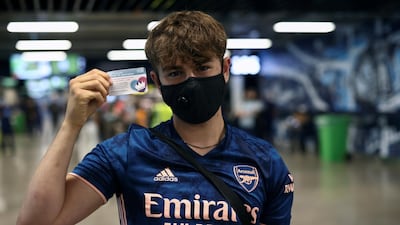Social media platforms have united for a new campaign to encourage young people in the UK to become vaccinated against Covid-19.
Snapchat, YouTube, TikTok and Reddit are among the platforms to team up with the UK government as it moves to the final stage of its successful vaccination drive.
More than one million vaccine appointments were booked in England at the weekend after the programme opened up to include over-18s on Friday.
By July 19, it is hoped that all adults will have had their first dose and everyone aged over 50 – as well as the clinically extremely vulnerable - will have been offered their second.
But data suggests people between the ages of 16 and 29 have the highest level of vaccine hesitancy in the UK.
The Office for National Statistics said 13 per cent of people in that age bracket were unsure about being vaccinated against Covid-19.
It is hoped that joining with social media platforms will help combat misinformation and encourage more young people to receive a shot.
Snapchat users will be able to use new NHS stickers and a filter that says "I've had my vaccine", while TikTok will feature videos with scientists to explain how the vaccines work.
Facebook and Instagram are not among the platforms involved in the government campaign.
Dr Karan Rangarajan, an NHS surgeon and influencer who has 3.9 million followers on TikTok, said people in their late teens and early 20s were the prime targets of the project.
“They are also in the UK the last cohort to be eligible for the vaccine so it's a really important group to target,” she said.
The campaign was launched on the same day that authorities planned to ease all social distancing restrictions in England.
UK Prime Minister Boris Johnson was forced to move the date set out in the road map to July 19 because of increasing concern over the spread of the Delta variant of Covid-19.
Britain on Sunday recorded 9,284 new cases and six deaths within 28 days of a positive Covid-19 test.
Although lower than recent days, the number of new cases reflects an upward trend in recent weeks, driven by the spread of the Delta variant.
But analysis of National Health Service Test and Trace data suggests fewer than one in 200 travellers from countries on the UK's "amber list" tested positive for Covid-19.
That increased calls for the government to drop the traffic-light system for international travel.
Only 89 of 23,465 passengers who travelled to the UK from amber-list countries between May 20 and June 9 tested positive – a rate of 0.4 per cent. The data showed no “variants of concern” were detected.
Health Secretary Matt Hancock is also reportedly considering a plan to remove the self-isolation rule for fully vaccinated people who come into contact with a positive case.
Under the proposal, daily lateral flow testing would replace the isolation and quarantine rules for vaccinated people, although no final decisions have been made.
Scientists continued to emphasise the importance of people receiving both doses of a Covid-19 vaccine.
However, Anthony Harnden, a professor of primary care at the University of Oxford, said the next challenge for ministers would be the distribution of booster shots in the autumn.
"The key question is how long do these vaccines last and what is the duration of protection," he told BBC's Radio 4 Today programme.
Business Secretary Kwasi Kwarteng said on Monday that the remaining restrictions were unlikely to be lifted before July 19.
“Hopefully on July 19 everything can revert back to some kind of normality,” he told Sky News.
“It could be before, but I think it’s unlikely. Generally, we’ve stuck to the dates we’ve set.”

